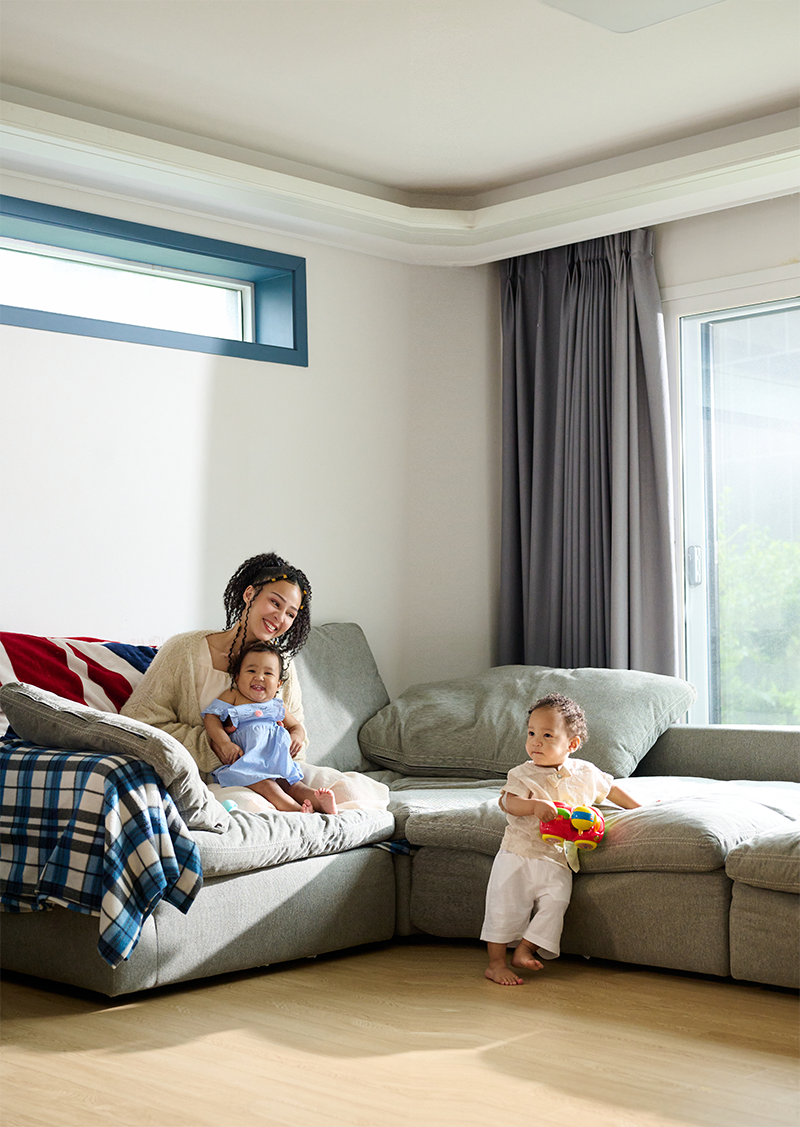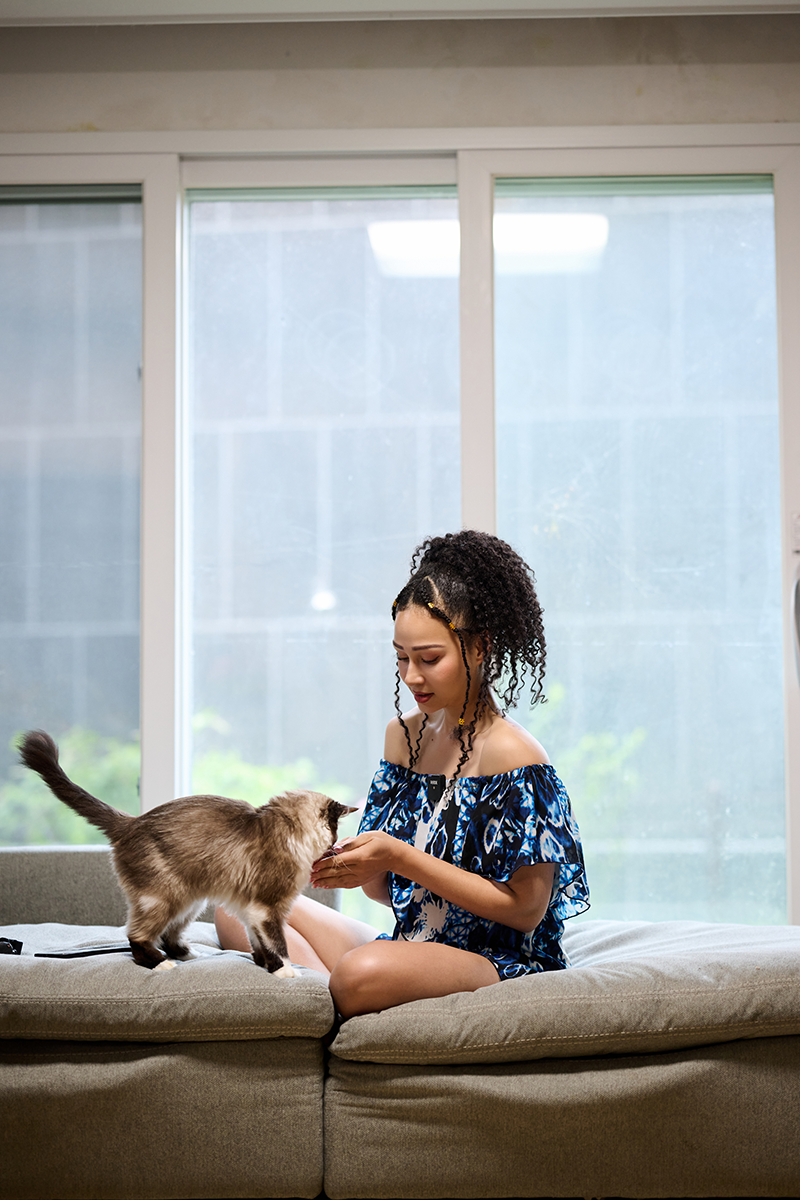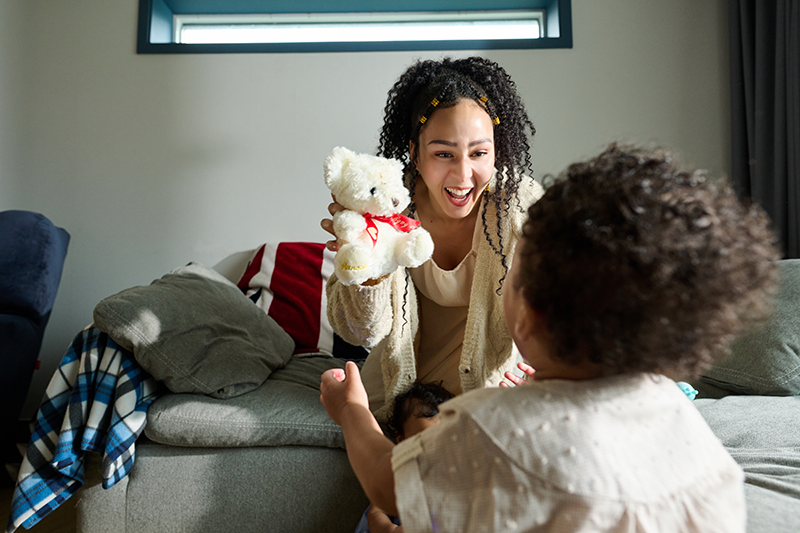American Megan Moon introduces Korea on her YouTube channel “Megan Moon” to hundreds of thousands of followers and inspires many of them to not wait to chase their dreams.

Arriving in Korea in 2012, Megan Bowen intended to stay for only a short time, but instead she got married and became Megan Moon, a successful YouTuber and mother of twins.
Megan Moon sits on a vast royal blue sofa in her living room, which overlooks a spacious lawn sparkling with late morning dew. There is a tranquil ease to her home in Paju, a 35-minute drive north from Seoul and much closer to the Korean Demilitarized Zone. The air is breezy, and the neighborhood is almost rural and very quiet.
She had the same backdrop growing up in the American South, where deer would stop by her yard. Now, after living in Seoul for ten years, she is resettling with her husband, a pattern maker who designs outfits for, among others, Korean celebrities, and her twin children, who were born last year. They are not alone. Hundreds of thousands of subscribers to Moon’s popular YouTube channel “Megan Moon” get glimpses of her home life and, most of all, aspects of Korean culture and society.
Throughout her years in Korea, Moon has committed herself to adopting what she perceives to be the positives of Korean culture, without neglecting those of her American background. Culturally, she now sees herself as “somewhere in the middle.”
YOUTUBE SUCCESS
Beguiled by the sound of spoken Korean, Moon Megan plunged into learning the language and now speaks Korean effortlessly. She feels her proficiency helps her understand the culture, which in turn broadens the dimensions of her YouTube videos. “I think through language you can kind of understand how people think in their cultures because the way grammar is set up really determines, I guess, how you think about stuff.”
It is a full-time job juggling the production, administrative, and creative demands of her YouTube channel, but having an audience of 900,000 subscribers is enough to attract paid ads. Using a camera-facing vlog format, Moon takes subscribers with her, talking to Koreans about their everyday activities and favorite local places.
One area that is difficult to convey to those who are entirely unfamiliar with Korea is food. The experience of Korean food is deeply connected to the country’s culture. In Moon’s case, she initially found it challenging to eat boiling hot stews and soups and waited up to ten minutes to let them cool down. Now, she does not hesitate. “I just dig in. So, I think I’ve adjusted to wanting piping hot food. The last time we visited America, all the food at the restaurants was just so cold. ‘Where’s the steam?!’”
Moon also marvels at how Korean cuisine uses all parts of a given ingredient, resulting in less waste compared to the United States, where some parts would likely be thrown away. Sweet potato stems are one example. “They are awesome,” Moon declares. “And then the garlic stems. Sometimes it’s just natural weeds that grow outside. When I went to America and I was driving, you could see mugwort on the side of the road. We would not even think to eat it. Here, people eat those things.”
Below her videos—particularly the more recent ones, which involve challenges, personal goals, and family life—are comments by throngs of inspired subscribers. Moon is aware of the wide impact of her content. Foreigners approach her on the street and say they came to Korea after watching her videos. “They say, ‘It was my dream, but I was scared,’” Moon says. Hence, the message she seeks to deliver on her channel is to encourage people to try to achieve goals in life.
“I have had things that did not work out, like trying to sell clothing online. But I can just say, ‘Well, that’s not for me. Move on to the next thing!’ Life’s too short. And if you don’t try, then you don’t know if it’s going to work well or not,” she says.
IMPRESSIONS

Moon balances her family responsibilities and YouTube vlogging with personal challenges such as meeting fitness goals.
Food pops up again when Moon describes how her journey to Korea began. “I went to Korean restaurants. The food was good and the side dishes were free, so I kept going while I was in college,” she recalls. “And I heard the Korean language and thought it was beautiful. I wanted to learn it and the staff told me about Korea.”
After graduation, Moon set out for Korea in 2012 for a two-year stint teaching English.
For many foreigners who call Korea “home,” their first impressions are a whirlwind of new beginnings. Moon was struck by being in an ethnically homogenous place for the first time. Though not surprising, it was an eye-opening experience being surrounded only by Koreans.
“It was kind of strange coming from America, which is more of a melting pot,” she recalls. “It wasn’t a bad thing, but I remember finding it interesting to see just one type of person.”
Another adjustment was a lack of even casual relationships. The relaxed pace of her community in the United States was conducive to becoming acquainted and staying connected. But in Seoul, the intense lifestyle and strong work ethic cuts into time for socializing.
Still, the changes in atmosphere were not enough to prevent the sojourn from becoming an open-ended move. “I decided to stay because I felt at home in Korea,” she explains. “I think the culture and country match me well and I figured that I could start a new life and get married here. I really like Korean people. They are very nice and helpful.”
MOTHERHOOD
Moon’s life changed, of course, with the birth of her twins, a boy and a girl: Rubin and Luna.
“Two human beings need me all day, and not just for food and cleaning. They need help regulating their emotions. They need attention and stimulation. You have to teach them how to be people. Like every little thing you do, you have got to show them, right? That’s the most difficult part, I guess. I am sort of a perfectionist. I like to do everything well. So, I’m not just going to sit here and show them cartoons or something.”
Her main goal is simply giving her children the confidence to live freely and do what makes them happy. “I would just say I want my children to be growth-minded, to find joy in overcoming challenges. Then I think they will be fine, even if they just want to work at a convenience store.”
Amid her YouTube and parental responsibilities, Moon carves out time just for herself—a workout to recharge emotionally and maintain fitness. In 2021, she challenged herself to get into shape for a bikini model competition. Her quest was captured on her channel and was also the subject of a KBS ary. And she won the contest.
MIXED HERITAGE AND IDENTITY

Moon strives to raise her children to be happy and true to themselves, whether in a Korean or American cultural context.
A video uploaded in July 2013, titled “Q&A How do Koreans react when they discover I’m Black?” has over 1.3 million views. In it, Megan says she is “Black, but really, really light-skinned,” and introduces her parents through photographs. Her mother is of mixed heritage, with White, Black, and Native American ancestors. Her father is Black. Growing up, Moon was labeled and singled out for her paler complexion. But she anchors her identity elsewhere, namely in her personality and actions.
Mindful of being made to feel like an outlier as a child, she wants to avoid putting an exact label on her children. “I think we are just going to kind of let it flow more naturally: You are Korean. You are American. You speak two languages. Whatever. We celebrate Christmas and Chuseok.”
As Moon grew up, she became the kind of person who could thrive in different environments. “I’m a very driven, goal-oriented person. I like to take on challenges,” she says, crediting her father for her attitude.
When she was six years old, she signed up to be a cheerleader. The training required several laps around a football field, some 2.5 kilometers per lap. She hated the routine and wanted to quit. But her father refused to support surrendering. “He was like, ‘No, you can’t quit because you might learn something through it.’” From that point onward, Megan’s father completed the runs with her.
“That was a big thing for me. It really shaped the way I started viewing things. Maybe if my dad had said, ‘You want to quit? Okay, quit,’ I might not even be here in Korea today. I think I would have had a different mentality and viewpoint on life in general.”
What is her next challenge? The list is long, she assures. One of them is especially unique and unexpected.
“Actually, I want to get my bus driver’s license. Can you imagine: a young, foreign woman is your bus driver in Korea?”
Daniel Bright Writer
Han Jung-hyun Photographer